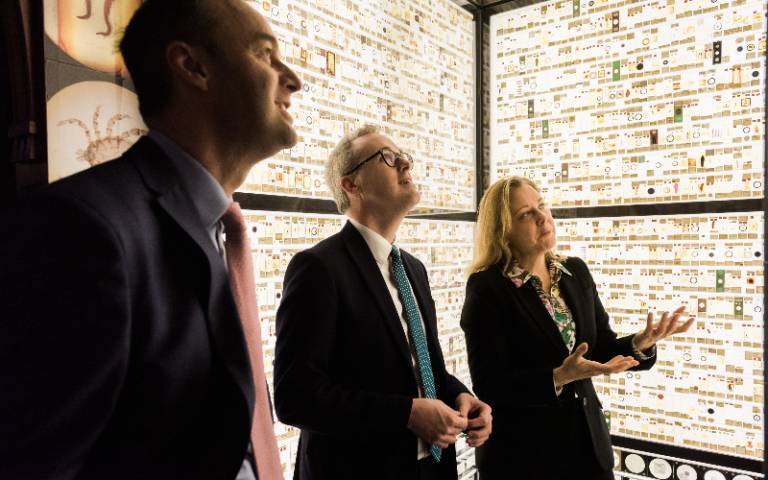UCL's historic Grant Museum of Zoology hosted Arts Minister, Lord Parkinson of Whitely Bay, as he announced £4 million to make UK museums and galleries more accessible.

Funding will be awarded to 33 museums and galleries throughout the UK to make collections more accessible to a broader range of the public through efforts to build ramps, improve displays and improve collection storage. A particular focus of the awards this year is to make museums more sustainable by supporting efforts to adopt energy-saving measures.
UCL's Grant Museum of Zoology is set to receive £100,000 to develop a new "Species Under Threat" narrative running throughout the museum to increase understanding around the human impact on the planet's diversity of life. The update will range from introducing a more theatrical element to the museum to practical upgrades to many of the museum's display cases for better specimen management.
Kat Nilsson, Director of Museums and Cultural Programmes at UCL, said: "This funding will enable us to improve the visitor experience of the Grant Museum which has over 40,000 visitors each year. We'll be able to offer an updated narrative around biodiversity and the planetary crisis and make stronger connections to UCL research working towards a more sustainable planet."
Professor Geraint Rees, UCL Vice-Provost (Research, Innovation & Global Engagement), said: "Museums help us understand the world. This generous grant will enable us to revise how we present our zoological collection to improve the experience of our 40,000 visitors annually. They will now be able to see, hear and touch the diversity of life and understanding our human impact on it, challenging their own actions on sustainability through experiencing narratives of exciting research and positive action."
Established in 1827 as a teaching collection in comparative anatomy, the Grant Museum of Zoology is now home to around 68,000 zoological specimens, ranging from extant and extinct animal skeletons, glass and wax animal models, fossils, and models of prehistoric animals. It continues to serve as a teaching collection to university students, researchers and the wider public.
Dr Paul Ayris, UCL Pro-Vice-Provost (Library Services), said: "The Grant Museum of Zoology at UCL is one of the oldest natural history collections in the UK and the only remaining university zoological museum in London. It has contemporary relevance in its active use in teaching our students, as a research resource and for external audiences to connect with challenges the planet faces through the specimens and by showcasing UCL research. The fantastic generosity of the DCMS Wolfson Fund will enable us to further our work in these areas."
Both the Department for Digital, Culture, Media & Sport (DCMS) and the Wolfson Museums and Galleries Improvement Foundation contributed £2 million for this year's award by the joint DCMS/Wolfson Museums and Galleries Improvement Fund. Over its 20-year history, the joint fund has awarded more than £50 million, supporting more than 400 projects in museums and galleries across the country.
Lord Parkinson of Whitley Bay, Minister for Arts and Heritage and DCMS Lords Minister, said: "Thanks to this combination of public funding and private philanthropy, these awards will help people who may have previously found visiting museums and galleries difficult and make sure everyone can enjoy and engage with the wonderful collections and exhibitions they offer."
The Wolfson Foundation is an independent charity with a focus on research and education. Its aim is to support civil society by investing in excellent projects in science, health, heritage, humanities and the arts.
Since it was established in 1955, some £1 billion (£2 billion in real terms) has been awarded to more than 12,000 projects throughout the UK, all on the basis of expert review.
Paul Ramsbottom, Chief Executive of the Wolfson Foundation said: "While the projects funded are many and varied, they will all improve access to the treasures of our museums and galleries - allowing more people to enjoy and learn from these impressive collections, as well as safeguarding them for the future."






